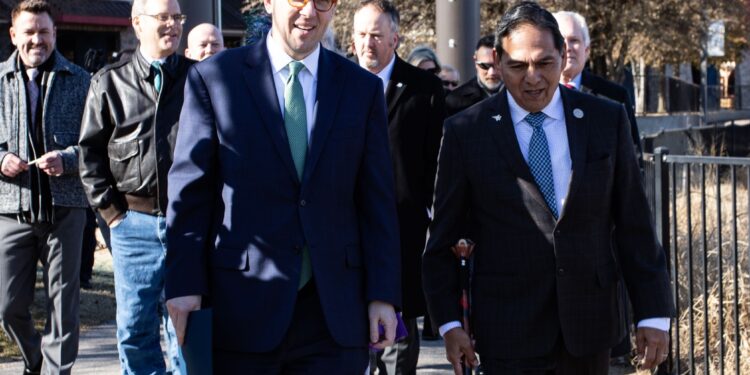TVLSE, Oklahoma – The Muscogee (Creek) Nation, the City of Tulsa, and the City of Jenks held a press conference for the official announcement and agreement signing for the Tulsa/Jenks Low Water Dam Project along the Arkansas River that is a part of the “Vision Tulsa 2025” on the Riverwalk Crossing in Jenks on Jan. 12.
The National Council held an emergency session to address TR 22-182, which would pledge $8,192,000 towards the South Tulsa/Jenks Low Water Dam Project on Dec. 28.
The project will create a new lake in the Arkansas River and construct a pedestrian bridge from 71st to 101st streets. The resolution executes the Memorandum of Understanding between the MCN, the City of Tulsa, the City of Jenks, and the Indian Nations Council of Governments.
The resolution passed with a vote of 8-6.
The idea called “Vision Tulsa 2025” came across voters’ ballots in 2016 with one goal of investing in the Arkansas River by building a dam with a total of $64 million coming from Tulsa and $17 million Jenks in 2016 towards the project. At the cost of nearly $100 million, the voters did not approve the funds needed leaving the project at a standstill for over half a decade.
The project would only move forward due to the lack of funding with the Council’s approval. Apparently, the Council’s decision “saved” the project by pledging what was needed to fulfill the budget submission to the Department of Transportation just two days before the deadline on Dec. 31.
The DOT announced that Tulsa would receive grant funding from them to create a multimodal trail system in conjunction with the dam in August 2022. INCOG had committed $8 million to the project before determining the entire funding situation in early 2022.
INCOG Executive Director Rich Brierre stated the investment as a significant step forward for the organization’s shared vision of a series of river lakes on the Arkansas River.
Okmulgee District Representative Nelson Harjo Sr. sponsored the legislation saying that he sees this as an opportunity for the tribe to generate revenue that can be poured back into the tribal citizens.
Harjo believes the dam will make the area more “family-friendly” with more development opportunities.
Even before his constituency, Harjo was interested in the project. Before its first announcement when the cities (Tulsa and Jenks) asked the Nation for funding in 2015.
At that time, the Arkansas River Infrastructure Task Force planned to ask the NC to pay a portion of $242.7 million towards the project, which was not feasible for the tribe after a $365 million investment in their own project in the same area.
After the initial request, longstanding Tulsa District Rep. Robert Hufft told Muscogee Nation News, “The Council’s not really going to contribute to something like that,” further stating the MCN’s benefit to the project was much less than what it was worth. “It benefits the city and the state more than us to some degree.”
Mayor G.T. Bynum claimed to have met with (former) Principal Chief James Floyd regarding the project in early 2016.
Two days later, news reports circulated that the MCN and the City of Tulsa entered a private partnership where the MCN would fund the long-term maintenance of two low-water dams (proposed as part of the Vision 2025 measure) if Jenks and Tulsa voters approved the Vision package.
It was later confirmed the MCN did not enter the partnership with a statement on Feb. 15, 2016.
The Nation’s official statement was sent to the former Mayor of Tulsa, Dewey Bartlett, stating the inability to invest in the project. Following the initial announcement, the MCN sent two more statements explaining their position with the support of the project without monetary contribution.
“I know the price back then wasn’t feasible for us,” Harjo said. “But based on the discussion we had and looking at it now, I knew that to develop a little more economically as far as the Riverwalk and our casino (Riverspirit Casino and Resort) is concerned, to make it more attractive, the low water dam was necessary.”
Harjo claims that due to history, some of the Council may have held a little grudge of distrust when it came around to voting for the resolution.
Despite the rift, the Council has given trust back to the City of Tulsa with the allocation and agreement for a return of infrastructure. The Nation believes this agreement is an important step forward in the joint plans between the tribe and cities.
Principal Chief David Hill responded to the Council.
“I want to thank our National Council for its diligence in working toward a plan that takes care of the nation while joining in the shared vision for the future with our partners,” Hill said.
For Jenks Mayor Cory Box, the years of discussing and planning can now be implemented.
“We are excited to see this low-water dam project become a reality,” he said. “We are thankful to the voters who overwhelmingly supported this years ago and our Tulsa, INCOG, and Muscogee Nation partners.
“We consider this project the biggest in our city’s history.”
Tulsa Mayor G.T. Bynum agreed that the partnership should yield more benefits than just the lake and trail system.
“I look forward to working with them, not just in establishing this lake but also in developing the Muscogee (Creek) Nation’s adjacent business holdings, which will benefit tribal citizens far beyond the Tulsa metro,” he said.
“The Muscogee (Creek) Nation is always willing to sit down and work with our partners in the cities of Tulsa and Jenks to advance development, growth, and prosperity on our reservation,” Principal Chief David Hill said in a statement. “This agreement is a win-win for all parties and an example of what we can achieve when we work together.
Survey, design, and engineering work is expected to begin in early 2024 and continue through 2025, with construction starting in mid-2025. A completion date is expected by mid-2027.





